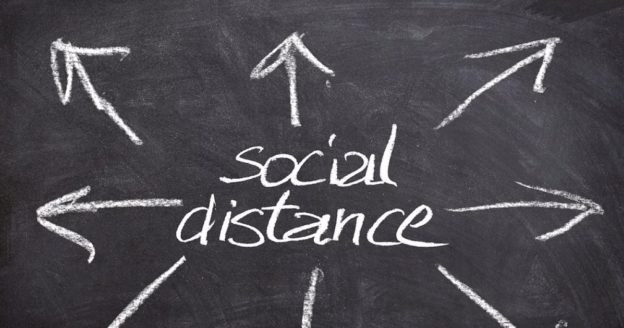I was running up the mountain the other day. A couple was walking down it. I quickly crossed over, so as not to expirate all over them. To my surprise, they thanked me profusely.
I’m healthy; they looked fit. Distancing may not have been necessary in this case. Yet, in this simple act of conscious distancing, in the epochal age of a terrifying, communicable disease—my neighbors and I had come closer than ever before. Fear gave way to fellow feeling.
Having lived in both the developed and underdeveloped world, I have always associated social distancing with civility and civilization.
Cultures that honor personal boundaries have always seemed better than cultures which don’t—more genteel, refined and respectful.
Ditto people who keep a respectful distance: They have more merit than those who get in your face.
Which is why the wish expressed by so many freedom-loving protesters to violate the personal space of others is vexing.
Which is why comments such as the following are anathema:
“Your ‘health’ does not supersede my right.”
“Give me liberty or give me COVID-19.”
“I am not required to descend into poverty for you.”
In the absence of clinical therapies or a vaccine for coronavirus, the successful return to work rests, very plainly, on the willingness of the citizenry to cover up, keep clean and keep a distance. Why would anyone wish to infringe on another’s personal space, when the stakes are clearly so high?
Insisting on unfettered freedom to come and go as one pleases, sans protection, comes at a grave cost to others—it could constitute aggression against innocent others.
By the same token, the shuttering of private property by the State is an incontrovertible violation of private property rights.
“Without property rights,” wrote Ayn Rand, “no other rights are possible. Since man has to sustain his life by his own effort, the man who has no right to the product of his effort has no means to sustain his life.”
Even more fundamental, however, is that without dominion over one’s self—self-ownership—there can be no property rights. Rights to the avails of your labor originate in the right of self-ownership. If you don’t own yourself, you cannot own anything else, or produce anything, the avails of your labor and the products of your mind included.
And if you are DEAD, DYING or INCAPACITATED—you own nothing (at least metaphysically; legally, you still own what you own).
In libertarian theory, private property rights originate in that most important of all titles: The title in one’s own body. That body, that fount of life whence all rights originate, is the legitimate object of government protection in a pandemic.
For, as I noted years ago, “Whether they are armed with bombs or bacteria, stopping weaponized individuals from harming others—intentionally or unintentionally—falls within the purview of the night-watchman state of classical-liberal theory.”
The volcanic anger is understandable. The heartbreaking calls from restive protesters to reopen the American economy come from across the country: California, Colorado, Florida, Idaho, Maryland, Michigan, Minnesota, Missouri, New Hampshire, North Carolina, Oklahoma, Texas, Utah, Virginia and Wisconsin North Carolina, Ohio, Michigan, Washington state.
Against this background, the natural rights of economically stricken individuals to reopen their businesses are righteous; they stem not from a state-created right or regulation. Rather, the right of ownership is the very extension of the right to life. In order to survive, man must—and it is in his nature to—transform the resources around him by mixing his labor with them and making them his own. Man’s labor and property are extensions of himself.
So, my countrymen are correct to protest the shuttering of their privately owned property, also their sole means of sustaining their lives.
All the same, there is another, equally compelling side to the ethics of this emergency situation. It is this:
Each and every individual is or could be, inadvertently, harboring a weapon of mass destruction. Yes, a WMD—for how many men and women have died and will still die because of the inadvertent actions of the coronavirus-carrying Index Patients, during the “seeding events”?
Each one of us could be firing off deadly virus into a defenseless population, bereft of immunity. Each one of us could become armed and dangerous, or be felled by someone who is.
In this case, individuals who willfully violate social distancing strictures can be viewed as willful aggressors against innocent others.
At once succinct and to-the-point, a reader whose online handle is “Mister Bigglesworth” summed it up: “I’m not a constitutional scholar, but you know what’s unconstitutional to me? Dying from some Oriental virus.”
If I appear to be struggling with the ethics of this emergency—it is because I am. I must. This is vexing stuff.
One thing I know, and it is that the sin of abstraction here is unforgivable—it is the propensity to settle for nothing less than an ideal version of liberty. Refusing to grapple with the political reality in which we ordinary mortals are mired is to dwell in the arid arena of pure thought.
In conversation with a colleague about the ethics of this situation, she remarked: “We live under a given political system, and we can’t just wish it away. Hence, there will be actions taken within that system that are relatively good or relatively bad. The thing we must always guard against is this:
Governments use crises to expand their power. Even when the crises are over, the expanded powers are often left in place, or certain key vestiges of these powers become a part of the institutions.
“This we must guard against.”
©2020 ILANA MERCER
WND, April 23
Unz Review April 23
Quarterly Review April 25
CATEGORIES: Argument, COVID-19, Ethics, Healthcare, Libertarianism, Paleolibertarianism, Political Theory, Private Property Rights

 print
print